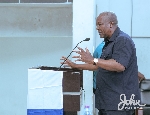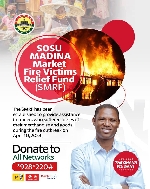Ghana can do better in Global Tobacco Industry Interferences Index report – VALD
 Ghana was scored 58
Ghana was scored 58
The Vision for Alternative Development (VALD) has expressed concern about the continuous existence of tobacco industry interference in the country’s public health policies.
This follows the recent global tobacco industry interferences index ranking report in which Ghana was scored 58.
Uganda, Peru and the United Kingdom were, however, scored between 30 and 39, an indication that “the level of industry interference in Ghana is higher than that of countries that ranked below 39.”
In the index ranking report, the lower the score, the better or the fewer industry interferences in the country in question.
A statement issued by VALD on Tuesday, 17 November 2020, noted that Ghana can perform better on the Global Tobacco Industry Interferences Index ranking.
“In Ghana, the tobacco industry has, over the years, benefitted and still benefitting from the government’s actions. For instance, the government made a declaration to ban the use of shisha in 2018 but this is yet to take effect; an appeal from the Ghana Health Service to ban the use of tobacco products in Ghanaian movies is also yet to take effect; travelers (diplomats) are permitted large quantities of duty-free tobacco products in the country; there is a laxity on the part of Ghana’s government to raise taxation on tobacco and tobacco-related products despite calls by civil society organisations in the country.
“It has been observed that the government has not made any policy attempt to increase taxes on tobacco products for six years (2015-2020), a situation serving as an incentive to promote the business of the tobacco industry. These are indications that government policies support or benefit the trade activities of the tobacco industry in the country,” VALD said in its statement.
According to the report, “the government does not disclose its meetings with the tobacco industry or any form of engagement with the tobacco industry because there is no specific regulation that specifies the disclosure of meetings. However, the Tobacco Industry Regulations, LI 2247 under industry interference stipulates that any interaction between the tobacco industry and the regulator must be strictly limited to tobacco control and enforcement.’
The report also revealed that there is no “strict prohibition of contributions from the tobacco industry to governments and its agencies, although the 2012 Public Health Act under sponsorship indicates that a “person shall not initiate or engage in any form of tobacco sponsorship.”
VALD noted that “since the passage of the Tobacco Control Act in 2012, Ghana has not developed a code of conduct for public officials in dealing with the tobacco industry in line with WHO FCTC Article 5.3” thus the gaps “in the policies and legislation have the potential to actively promote tobacco industry interference.”
VALD further noted that: “Though the high burden of tobacco use is a global concern, and historically perceived as a public health problem for high-income countries (HICs), recent evidence suggests low-and middle-income countries (LMICs) are now disproportionately affected by high tobacco-related morbidity and mortality.”
VALD, however, stressed that evidence available in other jurisdictions has “pointed to the activities of the tobacco industry to prevent or delay implementation of the WHO FCTC and local laws and policies in individual countries” and although Ghana’s score is not bad, it had some recommendations for government.
It recommended that the government “take steps to improve transparency in its engagement with the tobacco industry including making known any records of lobbyists in the country acting in the interest of the tobacco industry, Mandate the tobacco industry through development of policies to publicly report or declare its CSR initiatives in the country as this is not currently available in the public domain, Full disclosure in the media or website of all activities including revenue and profits, tax exceptions or any privileges the tobacco industry receives.”
It also recommended that government “develop a code of conduct to guide its agencies and officials in engaging the tobacco industry, develop programmes to regularly train or educate officials and agencies about FCTC Article 5.3. These programmes will equip them with the requisite knowledge to avoid falling prey to the activities of the tobacco industry or inadvertently facilitating the activities of the tobacco industry to undermine tobacco control policies in the country” and “mandate the Ministry of Finance to regularly review the price of tobacco products, tax regimes and propose an appropriate measure to effectively regulate the affordability and access to tobacco products.”
Source: classfmonline.com/Elikem Adiku
Trending News

Lack of public purse protection ‘pathetic’ – Sam Jonah calls out ‘weaponisation of state agencies against opponents, assault on press freedom'
04:02
Feeding grants'll be paid directly to school heads in my next gov’t – Mahama promises
11:02
Francis-Xavier Sosu rallies support to aid Madina market fire victims
19:30
Let's do away with 'slash and burn' politics- Adutwum
03:26
NDC Youth Wing expresses solidarity with nurses and midwives
10:08
Running mate: Ashanti NPP youth organisers distance themselves from Napo’s bid
10:11
NPP sets up disability secretariat
02:46
I'll ban all mining in water bodies, forest reserves – Kyerematen
12:04
2024 polls: 'Bawumia in pole position to take over from me' – Akufo-Addo
03:45
Asantehene commends Matthew Opoku Prempeh for conceiving GENSER Kumasi Pipeline Project
01:37



